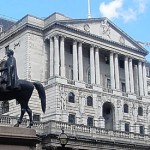 The Bank of England has kept interest rates on hold following stronger than expected economic growth in the wake of the Brexit vote.
The Bank of England has kept interest rates on hold following stronger than expected economic growth in the wake of the Brexit vote.
The Bank’s Monetary Policy Committee voted unanimously to keep interest rates at 0.25% but warned of rising inflation and slower economic growth.
Britain’s economy grew faster than expected in the last quarter by 0.5%, despite fears that uncertainty following the Brexit vote could lead to recession.
With output growth is expected to be stronger in the near term, the Bank said that UK-based firms’ access to EU markets could be “materially reduced”, which could hurt business over a protracted period.
The Bank expects inflation to rise from its current level of 1% to around 2.7% towards the end of next year and in 2018, before returning close to the 2% target in 2020.
While the Bank is unlikely to raise interest rates to combat a short-term inflation rise, it said there “are limits to the extent to which above-target inflation can be tolerated”.
In the minutes of the meeting the Committee said: “The future path of monetary policy would depend on the evolution of the prospects for demand, supply, the exchange rate, and therefore inflation. Monetary policy could respond, in either direction, to changes to the economic outlook as they unfolded to ensure a sustainable return of inflation to the 2% target.”
GDP growth is now expected to be 1.4% in 2017, up from the 0.8% forecast in August. However, the 2018 growth forecast was cut from 1.8% to 1.5%.
The Committee also voted unanimously to continue with the purchase of £10 billion of corporate bonds and government bonds of £60 billion.
The Bank cut interest rates to a new record low of 0.25% in August as part of a range of measures designed to help boost demand following the vote to leave the EU, warning that third quarter growth could plummet to 0.1%.
Following a stronger than expected performance from the economy, the Bank upgraded its growth forecast in September to between 0.2% and 0.3%, but said another rate cut was potentially on the cards towards the end of the year.
Howard Archer, chief economist at IHS Global Insight, said the decision to maintain interest rates reflected a stronger than expected performance of the UK economy and marked a “significant change” in the Bank’s policy stance.
He said: “The MPC have shifted to a neutral stance regarding future monetary policy from an easing bias in September.
“The upgrade to the near-term forecasts are obviously largely influenced by the resilience of the economy so far since June’s Brexit vote.
“We now believe that it is more likely than not interest rates will stay at 0.25% for a prolonged period – very possibly to 2020.
“It is also notable that Mr. Carney observed that the UK has an outstanding framework for monetary policy, which works well and does not need to be adjusted. This follows recent comments by politicians that could be construed to threaten the Bank of England’s independence as well as some attacks on Mr Carney and the MPC – particularly on their stance on the risks from Brexit.”




